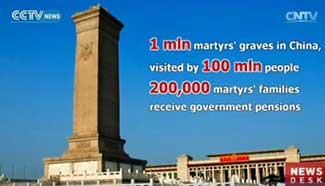WASHINGTON, Sept. 30 (Xinhua) -- The U.S. government will on Saturday give up its oversight of the core Internet technical functions, bringing the world a critical step closer to the global governance of the 47-year-old web that is now a part of our daily life.
If nothing unexpected occurs, the U.S. will cede its power of overseeing of domain name system, or phonebook of the Internet, fully to a California-based non-profit organization called the Internet Corporation for Assigned Names and Numbers (ICANN).
The "transition helps ensure that the Internet remains open, interoperable and stable in the long-term," the ICANN tweeted Friday.
POPULAR SOVEREIGNTY
Currently, the ICANN performed the so-called Internet Assigned Numbers Authority (IANA) functions pursuant to a contract with the U.S. Commerce Department's National Telecommunications and Information Administration (NTIA) that dated back to 1998.
The NTIA has promised from the beginning to privatize the IANA functions, but it was the whistleblower Edward Snowden's 2013 revelation about the depth of U.S. Internet surveillance that actually pushed the U.S. government to accelerate the transition process to ease international outrage.
However, the U.S. government refused to accept a plan that replaced NTIA's role with a government-led or intergovernmental organization solution. Instead, it insisted transitioning the functions to a "global multistakeholder community," which includes engineers, businesses, technical experts, civil society groups and governments.
In August, the NTIA finally endorsed the transition plan proposed by the ICANN, in which the latter's newly formed nonprofit public benefit corporation called Public Technical Identifiers will run post-transition IANA functions.
"It is a move away from nation-state sovereignty in cyberspace and toward popular sovereignty," Milton Mueller, a professor in the Georgia Institute of Technology and author of a book on ICANN, told Xinhua.
Calling the Obama administration's move "a wise decision," Yu Hong, an Internet expert at the University of Southern California, said the U.S. unilateral monopoly over the allocation of top level domain names as a unipolar geopolitical and military deterrent was unpopular.
She noted that the U.S. government has also taken "full" advantage of the last days of its oversight of the IANA functions to set the stage for ICANN's future evolution.
SOURCE OF IRRITATION
Some lawmakers and advocacy groups in the U.S. urged Congress to act to block or delay the transition, arguing it would "surrender" control of the Internet to China and Russia, an accusation denied by both the Obama administration and the ICANN.
"The transition proposal does not increase the role of governments over the Internet or ICANN as an organization," the ICANN said in a recent statement.
"The multistakeholder model appropriately limits the influence of governments and intergovernmental organizations to an advisory role in policy development. More than 160 governments actively participate as a single committee and must come to a consensus before policy advice can be issued."
The NTIA admitted that its role has long been "a source of irritation" to foreign governments and prompted calls by some governments to push for the United Nations, International Telecommunication Union, or another intergovernmental organization to take over IANA function stewardship.
"While support for multistakeholder governance has grown among nations in recent years, these calls for replacing the multistakeholder model with a multilateral, government-run approach will only grow louder if the U.S. government fails to complete the transition," the U.S. agency said.
SUBJECT TO U.S. LAWS
Meanwhile, the ICANN, just as NTIA Administrator Larry Strickling said, "always has and will continue to be subject to antitrust laws" in the U.S.
The ICANN also said "California law is the basis for the new mechanisms created to empower the ICANN community and hold ICANN the organization, Board and community, accountable."
Mueller said that it means the U.S. law will continue to have influence on the ICANN although "the amount of influence will not change."
"After Oct. 1, ICANN will be the steward of the IANA functions, and ICANN will be subject to new accountability arrangements that make it reflect the will of the global multistakeholder Internet community," Mueller said.
"We need to see how the new accountability mechanisms will work ... ICANN will need to work hard to make its policy process accessible to people from all regions of the world, speaking all different languages," he added.










